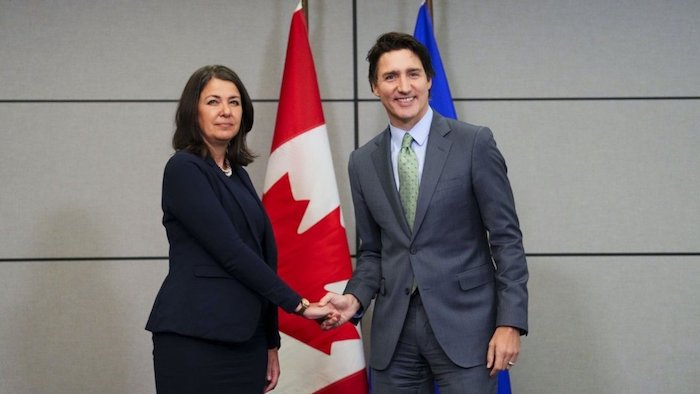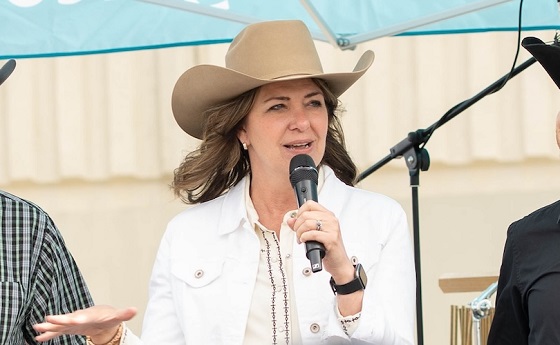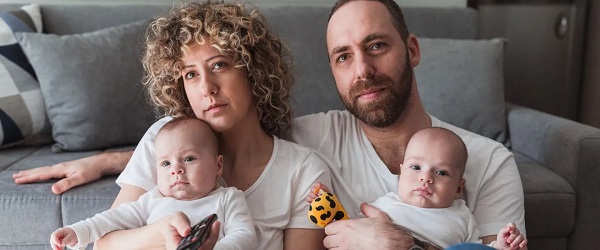Alberta
The Awed Couple: Can Ottawa Force Alberta To Stay In Its Lane?

Fact: Alberta and Saskatchewan were to enter Confederation in 1905 as a province named Buffalo. But Sir Wilfrid Laurier feared a landmass that big would threaten the domination of Quebec and Ontario in Canada. And so Buffalo was split into the two provinces we know today.
Of all the riddles that make up Canada’s current prime minister one of the most intriguing is how the grandson of a man, Charles-Émile Trudeau, who made his fortune in Montreal gas stations is now hellbent on destroying the same industry.
In this obsession to end fossil fuels, Trudeau does have the company of many other heirs to fortunes created by oil and its products. The ranks of Green NGOs and political movements are thick with names like Rockefeller, Getty, Morgan, Flagler and more, heirs with a guilty conscience about perceived climate-change destruction.
But while most of these families have chosen discreet roles in their quest, Trudeau’s climate infatuation has propelled him to prime minister of Canada since 2015. In that time “Sunny Ways” Justin has obsessively pursued his goal of transitioning Canada from the fossil-fuel giant to an imagined Shangri-la of gentle breezes and warm sunshine.
Nothing can shake him of his messianic role as saviour of the Frozen North. Likewise, no public disgrace or controversy can shake his loyal supporters who supported his father in the same manner. Buttressed by the lapdog NDP caucus he spouts buckets of enviro-nonsense to a docile media (which he has bribed to stay quiet).
Because subtlety is not a strong suit he even named a former Greenpeace zealot and convicted felon as his Environment minister. Which has naturally put him directly at odds with that portion of the country that exploits fossil fuels and (don’t tell anybody) floats the boat of federal budgets.
So when Justin proposed a Canadian Sustainable Jobs Act to turn energy workers into code writers and social workers by 2035 there was a degree of pushback amongst those who would lose their livelihoods. That plan was revealed last week by EnerCan (who makes up this dreck?) minister Jonathan Wilkinson.
Promising to convert Calgary’s public transit to all-electric, Wilkinson (former leader of the New Democratic Party‘s youth wing in Saskatchewan) proposed the ‘Sustainable Jobs Act’ advisory council that will provide the federal government with recommendations on how to support the Canadian workforce during transition to a ‘net-zero economy.” You can guess who’ll be on the advisory council, but don’t count on any Ford F-150 drivers.

Enter Danielle Smith, newly re-elected premier of Alberta. Smith and her advisors have declared as unworkable the federal government’s unilateral prescription for a carbon-neutral society by 2050. While they recognize the need for transition the Alberta solution is predictably less draconian than Trudeau’s Pol Pot prescription for moving the population back to a more bucolic lifestyle.
Specifically, Alberta wants “to achieve a carbon-neutral energy economy by 2050, primarily through investment in emissions-reduction technologies and the increased export of Alberta LNG to replace higher-emitting fuels internationally.” (Presumably Alberta will be joined by Saskatchewan in this pushback.)
Then came the hammer. “As the development of Alberta’s natural resources and the regulation of our energy sector workforce are constitutional rights and the responsibility of Alberta, any recommendations provided by this new federal advisory council must align with Alberta’s Emissions Reduction and Energy Development Plan.”
Translation: Federal legislation has to be in synch with provincial plans, not the other way around. In short, try to impose some Michael Mann fantasy on the province and it’s a no-go. Don’t like it? See you in court. In Alberta. Not Ottawa.
Will this constitutional gambit work? While Smith’s mandate from the recent election is hardly rock-solid, she does have the benefit of time in her four-year term. Trudeau has no such luxury, and launching a court case in Alberta would likely stretch past his mandate ending next year. Yes, the impertinence of Alberta would play well with his base in the 514/613/416. But let’s be honest, they are voting Trudeau even if he (in the words of Donald Trump) grabs them by the privates.
One thing you can be assured of when it comes to the PM. He will not be forcing any Canadian Sustainable Jobs Act on the Ontario auto industry to aid its transition to EV vehicles. There will be no helpful suggestions on the death of the automobile for the new mutlti-billion dollar VW battery plants cashing federal cheques in Windsor. He knows his voting base won’t buy it. But those Alberta saps?
The telling impact of this jurisdictional fight will be where Trudeau’s rival, Pierre Poilievre, comes down on the transition issue. With his election depending on the swaths of voters in the GTA shoulder ridings— where Trudeau’s mooting about crybaby Alberta will get a full airing— does he lend his support to Smith’s pushback?

Put simply, is backing Alberta sovereignty in the oil patch a vote-loser for a party still looking past “Hate Trudeau” as an election platform? You could see Poilievre rationalizing that he’ll get the seats in the West no matter what, so why not leave Trudeau to wrassle the Alberta bear alone?
Risky for sure. But if he gets the PMO seat in 2024 Poilievre can always play kiss-and-make-up later with Smith and her government. Can’t wait.
Sign up today for Not The Public Broadcaster newsletters. Hot takes/ cool slants on sports and current affairs. Have the latest columns delivered to your mail box. Tell your friends to join, too. Always provocative, always independent. https://share.hsforms.com/16edbhhC3TTKg6jAaRyP7rActsj5
Bruce Dowbiggin @dowbboy is the editor of Not The Public Broadcaster A two-time winner of the Gemini Award as Canada’s top television sports broadcaster, he’s a regular contributor to Sirius XM Canada Talks Ch. 167. Inexact Science: The Six Most Compelling Draft Years In NHL History, his new book with his son Evan, was voted the seventh-best professional hockey book of all time by bookauthority.org . His 2004 book Money Players was voted sixth best on the same list, and is available via http://brucedowbigginbooks.ca/book-personalaccount.aspx
Alberta
Danielle Smith slams Skate Canada for stopping events in Alberta over ban on men in women’s sports

From LifeSiteNews
The Alberta premier has denounced Skate Canada as ‘disgraceful’ for refusing to host events in the province because of a ban on ‘transgender’ men in women’s sports.
Alberta Premier Danielle Smith has demanded an apology after Skate Canada refused to continue holding events in Alberta.
In a December 16 post on X, Smith denounced Skate Canada’s recent decision to stop holding competitions in Alberta due to a provincial law keeping gender-confused men from competing in women’s sports.
“Women and girls have the right to play competitive sports in a safe and fair environment against other biological females,” Smith declared. “This view is held by a vast majority of Albertans and Canadians. It is also common sense and common decency.”
Women and girls have the right to play competitive sports in a safe and fair environment against other biological females.
This view is held by a vast majority of Albertans and Canadians. It is also common sense and common decency.
Skate Canada‘s refusal to hold events in… pic.twitter.com/n4vbkTx6B0
— Danielle Smith (@ABDanielleSmith) December 16, 2025
“Skate Canada‘s refusal to hold events in Alberta because we choose to protect women and girls in sport is disgraceful,” she declared.
“We expect they will apologize and adjust their policies once they realize they are not only compromising the fairness and safety of their athletes, but are also offside with the international community, including the International Olympic Committee, which is moving in the same direction as Alberta,” Smith continued.
Earlier this week, Skate Canada announced their decision in a statement to CBC News, saying, “Following a careful assessment of Alberta’s Fairness and Safety in Sport Act, Skate Canada has determined that we are unable to host events in the province while maintaining our national standards for safe and inclusive sport.”
Under Alberta’s Fairness and Safety in Sport Act, passed last December, biological men who claim to be women are prevented from competing in women’s sports.
Notably, Skate Canada’s statement failed to address safety and fairness concerns for women who are forced to compete against stronger, and sometimes violent, male competitors who claim to be women.
Under their 2023 policy, Skate Canada states “skaters in domestic events sanctioned by Skate Canada who identify as trans are able to participate in the gender category in which they identify.”
While Skate Canada maintains that gender-confused men should compete against women, the International Olympic Committee is reportedly moving to ban gender-confused men from women’s Olympic sports.
The move comes after studies have repeatedly revealed what almost everyone already knew was true, namely that males have a considerable innate advantage over women in athletics.
Indeed, a recent study published in Sports Medicine found that a year of “transgender” hormone drugs results in “very modest changes” in the inherent strength advantages of men.
Additionally, male athletes competing in women’s sports are known to be violent, especially toward female athletes who oppose their dominance in women’s sports.
Last August, Albertan male powerlifter “Anne” Andres was suspended for six months after a slew of death threats and harassments against his female competitors.
In February, Andres ranted about why men should be able to compete in women’s competitions, calling for “the Ontario lifter” who opposes this, apparently referring to powerlifter April Hutchinson, to “die painfully.”
Interestingly, while Andres was suspended for six months for issuing death threats, Hutchinson was suspended for two years after publicly condemning him for stealing victories from women and then mocking his female competitors on social media. Her suspension was later reduced to a year.
Alberta
Alberta’s huge oil sands reserves dwarf U.S. shale

From the Canadian Energy Centre
By Will Gibson
Oil sands could maintain current production rates for more than 140 years
Investor interest in Canadian oil producers, primarily in the Alberta oil sands, has picked up, and not only because of expanded export capacity from the Trans Mountain pipeline.
Enverus Intelligence Research says the real draw — and a major factor behind oil sands equities outperforming U.S. peers by about 40 per cent since January 2024 — is the resource Trans Mountain helps unlock.
Alberta’s oil sands contain 167 billion barrels of reserves, nearly four times the volume in the United States.
Today’s oil sands operators hold more than twice the available high-quality resources compared to U.S. shale producers, Enverus reports.
“It’s a huge number — 167 billion barrels — when Alberta only produces about three million barrels a day right now,” said Mike Verney, executive vice-president at McDaniel & Associates, which earlier this year updated the province’s oil and gas reserves on behalf of the Alberta Energy Regulator.
Already fourth in the world, the assessment found Alberta’s oil reserves increased by seven billion barrels.
Verney said the rise in reserves despite record production is in part a result of improved processes and technology.
“Oil sands companies can produce for decades at the same economic threshold as they do today. That’s a great place to be,” said Michael Berger, a senior analyst with Enverus.
BMO Capital Markets estimates that Alberta’s oil sands reserves could maintain current production rates for more than 140 years.
The long-term picture looks different south of the border.
The U.S. Energy Information Administration projects that American production will peak before 2030 and enter a long period of decline.
Having a lasting stable source of supply is important as world oil demand is expected to remain strong for decades to come.
This is particularly true in Asia, the target market for oil exports off Canada’s West Coast.
The International Energy Agency (IEA) projects oil demand in the Asia-Pacific region will go from 35 million barrels per day in 2024 to 41 million barrels per day in 2050.
The growing appeal of Alberta oil in Asian markets shows up not only in expanded Trans Mountain shipments, but also in Canadian crude being “re-exported” from U.S. Gulf Coast terminals.
According to RBN Energy, Asian buyers – primarily in China – are now the main non-U.S. buyers from Trans Mountain, while India dominates purchases of re-exports from the U.S. Gulf Coast. .
BMO said the oil sands offers advantages both in steady supply and lower overall environmental impacts.
“Not only is the resulting stability ideally suited to backfill anticipated declines in world oil supply, but the long-term physical footprint may also be meaningfully lower given large-scale concentrated emissions, high water recycling rates and low well declines,” BMO analysts said.
-

 Community2 days ago
Community2 days agoCharitable giving on the decline in Canada
-

 Business2 days ago
Business2 days agoCanada’s recent economic growth performance has been awful
-

 Alberta2 days ago
Alberta2 days agoCanada’s New Green Deal
-

 armed forces2 days ago
armed forces2 days agoOttawa’s Newly Released Defence Plan Crosses a Dangerous Line
-

 Alberta1 day ago
Alberta1 day agoAlberta’s huge oil sands reserves dwarf U.S. shale
-

 Health1 day ago
Health1 day agoSaskatchewan woman approved for euthanasia urged to seek medical help in Canada rather than US
-

 Business2 days ago
Business2 days agoCOP30 finally admits what resource workers already knew: prosperity and lower emissions must go hand in hand
-

 Indigenous1 day ago
Indigenous1 day agoResidential school burials controversy continues to fuel wave of church arsons, new data suggests






